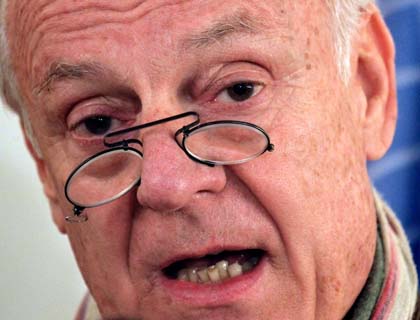WASHINGTON - The road to peace is never smooth, members of the United Nations Security Council said, vowing not be deterred by the recent assassination of the former Afghan president Burhanuddin Rabbani.
At a special Security Council briefing on Afghanistan, members remembered the crucial role being played by Rabbani in holding peace talks with the Taliban, and pledged to continue his reconciliation campaign.
Staffan de Mistura, Special UN Representative for Afghanistan, said the country was going through "a terrible, terrible time", especially since Rabbani's assassination. Rabbani had been a "highly respected friend to many of us and his death was a shock for us all".
He added: "But, as the Afghan people had repeatedly shown their capacity to recover from tragedies and sad losses, we feel that their drive for peace will not be deterred. The killers have not yet been identified."
However, history had shown that reconciliation efforts were particularly vulnerable to attack just at the moment when they began to have traction. In this case, the High Peace Council had just started dialogue towards bridging a "trust deficit" ahead of more substantive talks, the top UN official said.
Afghan Foreign Minister Zalmai Rassoul said, despite the assassination, the reconciliation process would continue. He added the notable importance of 2011 was that it marked 10 years since the end of Taliban rule, which had led to the opening of a new chapter in Afghanistan's history, defined by efforts to achieve what had eluded Afghans for far too long --- peace, stability and prosperity.
US Ambassador Susan Rice said Rabbani's assassination had only strengthened their collective resolve. "The United States would continue to work with Afghanistan to end the insurgency, pursue justice and realize a peaceful future," she pledged.
Rice said President Barack Obama had made it clear that the two countries' relationship would continue beyond 2014, as outlined in the US-Afghan Strategic Partnership document. "We will have a strategic partnership between our nations on the security, economic and institution-building fronts."
Russia's Vitaly Churkin said the ex-president's death reaffirmed the need for greater efforts to counter terrorism. "The security situation in many provinces continues to worsen, with more killings and abductions of civil servants and citizens alike. The elimination of Osama bin Laden had not led to a breakthrough..."
Mark Lyall Grant of the United Kingdom denounced as appalling and cowardly the murder of Rabbani, saying those responsible were sending a signal that they did not want a role in Afghanistan's future. Grant welcomed Afghan officials' pledge to press ahead with the transition process, and even to include members of the insurgency to ensure stability.
Maria Luiza Ribeiri Viotti of Brazil said the Afghan people should not feel discouraged. They must find strength in themselves and the international community to press ahead with peace and reconciliation, he said.
Ertugrul Apakan of Turkey said the heinous attack that killed Rabbani had also been directed against the ongoing peace and reconciliation efforts. Tsuneo Nisghida of Japan said the security situation remained challenging, with target assassinations of high-ranking officials and suicide attacks.
Indian Ambassador Hardeep Singh Puri said: "Tragically, the forces of terror and hatred have silenced yet another powerful voice of reason and peace in Afghanistan." The attacks pointed to a dangerous osmosis of ideologies, ambitions, training and operations among the terrorism syndicate, as India had repeatedly stressed, he pointed out.
Security Council President for the month of September, Nawaf Salam from Lebanon, reiterated his appeal for all parties to abide by international humanitarian law and protect innocent people, especially in hospitals and schools.
He condemned the assassination of Rabbani as an attempt to foil the High Peace Council's efforts to reconcile all elements of Afghan society, and called for pressing ahead with confidence-building with a view to reaching peace.

